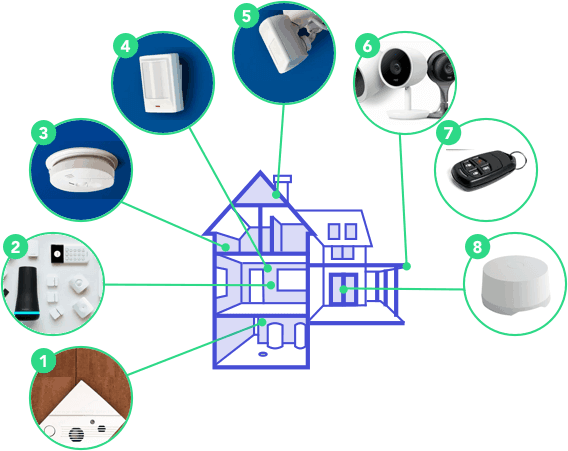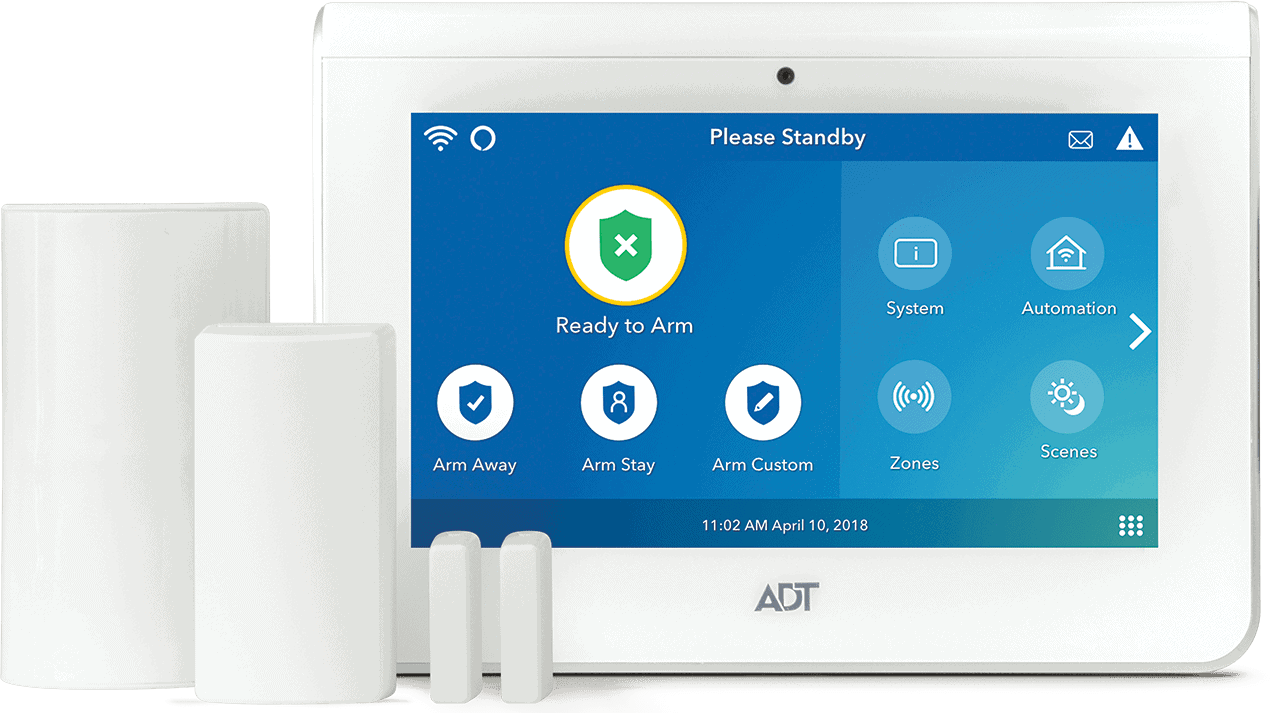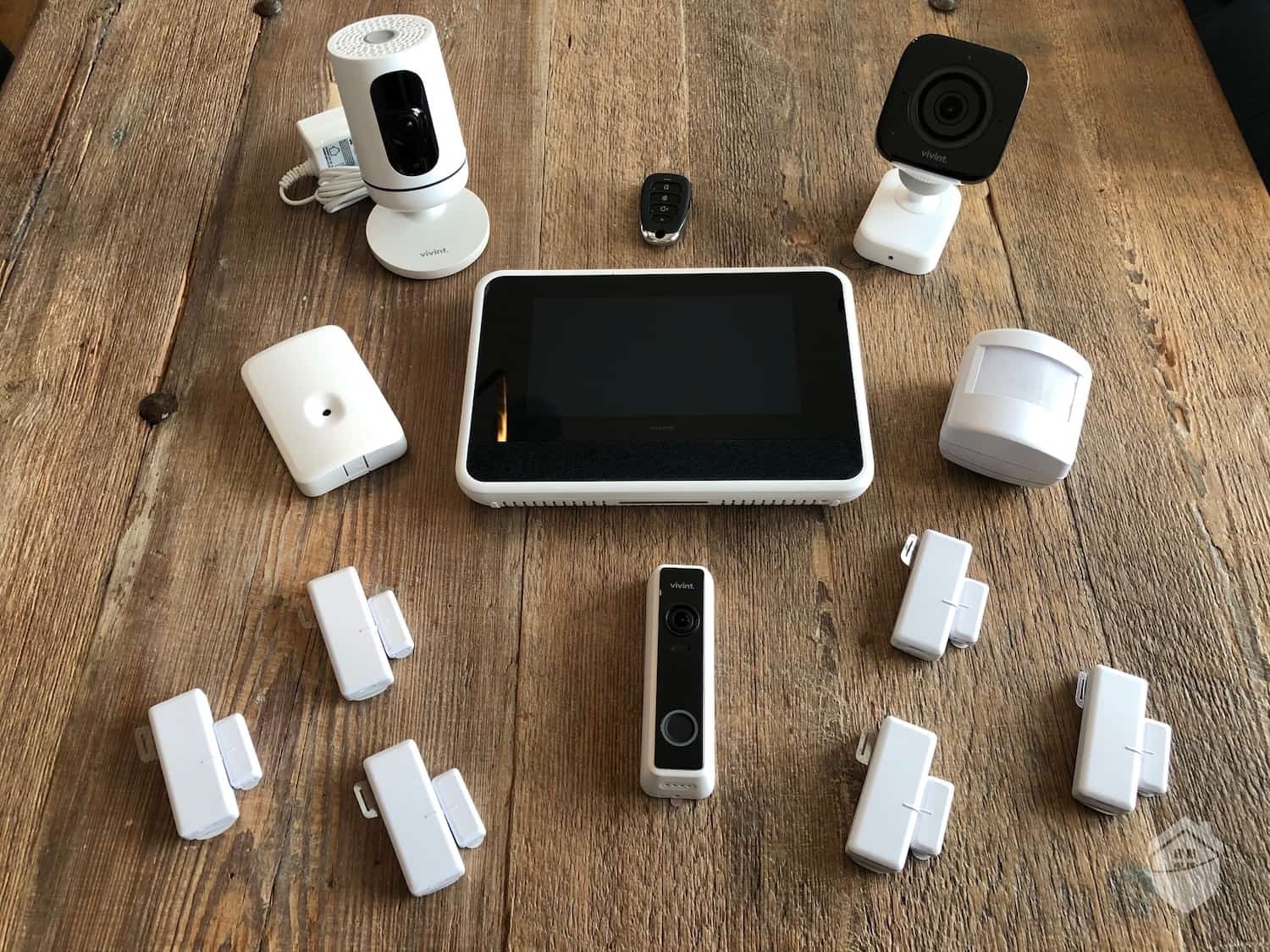Honestly, nobody wants to actually read their home security contract. The legal jargon could put anyone to sleep even if they already had their morning coffee. Heck, I wouldn’t judge you if you ended up using your home security contract as a pillow!
So, let’s take a moment to break down the legal terms in a home security contract so you understand what you’re signing up for. Trust me, it’s not as daunting as it seems, and understanding a few key terms can put you in the driver’s seat when it comes to choosing your home security system.
We’ll teach you how to understand home security contracts from any home security provider by covering the following topics:
What Is a Home Security Contract?
So, what’s a home security contract? In simple terms, it’s a handshake in writing between you and your home security provider. It outlines the details of what you can expect to receive from your home security service company and how much it costs. Essentially, it tells you every detail of your agreement with your home security provider.
Every home security contract will at least contain:
- Legal names of parties: Sounds formal, right? But it’s just you and the legal name of the security company.
- Purchase date: This is the day that you first pay your new home security provider and marks the start of your home security contract.
- Contract length: How long are you and your security provider going to be attached at the hip? It could be a short, month-to-month thing or a longer-term commitment stretching over a few years.
- Pricing: Here’s where the contract gets down to brass tacks, with a complete breakdown of all the costs involved: monthly fees, installation charges, late fees, and cancellation fees. It also tells you when and how to make your payments.
- Terms in case of default: These terms specify what happens if you fail to make payments or your provider fails to fulfill its commitments.
While these items will be in every home security contract, the specifics depend entirely on the type of security system and provider that you choose.
FYI: Here are our breakdowns of the contracts offered by the top three home security system providers:
Why Are There Contracts for Home Security Systems?
At first glance, it might seem like home security contracts are excessive. But they serve a few key purposes.
The Role of Contracts in Monitored Security Systems
Monitored systems are continuous services, so they require a monthly fee. This is where the contract, usually called a subscriber monitoring agreement, comes in. The contract gives you a clear idea of what to expect from your monitored security service, and it assures your provider that you’ll pay the monthly fee. It’s a straightforward way to ensure everyone has aligned expectations.
>> Read More: Best Home Security Systems With Monitoring
Making Home Security More Accessible
Contracts also help distribute the initial cost of expensive home security equipment like smart door locks and outdoor security cameras. Instead of a large upfront payment, home security contracts allow homeowners to make manageable monthly installments for their security equipment and installation. This approach makes home security more accessible to homeowners.
Contracts and Company Growth
I won’t pretend that home security contracts are for your benefit only. Home security providers also benefit from them. They allow providers to use them as collateral for borrowing money and establishing lines of credit for growing their company.
How Long Is a Home Security Contract?
A contract for a home security system can be as short as a year or stretch up to a whopping five years. But don’t let those numbers scare you! The industry standard is about 36 months.
But why does the length matter? Well, it directly affects your monthly payments since the cost of your equipment is spread over the length of the contract. In a nutshell, a longer contract typically means lower monthly fees.
>> Check Out: The Most Affordable Home Security Systems of 2023
Long-Term Contracts: Weighing the Pros and Cons
Now, a long-term contract might seem like a big commitment — and it is — but it’s not all doom and gloom. Let’s break down the pros and cons to help you figure out if a long-term home security contract is right for you.
| Pros | Cons |
|---|---|
| Lower monthly payments: This is a biggie. The cost of your system is spread over a longer period, so your wallet feels a lighter pinch each month. | Penalties for canceling: If you decide to break up with your service provider before your contract ends, you’ll face a cancellation fee. |
| Free use of equipment: Most companies let you use their equipment for free during your contract. Not too shabby, eh? | Ownership of equipment: Here’s the thing: You usually don’t own the equipment that your service provider installs. So, if you don’t return it at the end of the contract, you have to pay for it. |
| No-cost repairs or replacements: If something goes wrong with your equipment, your provider usually steps in and fixes or replaces it for free. | Credit requirements: To get a long-term contract, you usually need to be a homeowner with a good credit rating. |
| Professional advice and installation: Some companies, like ADT and Vivint, even throw in a professional security consultation and installation. That’s expert advice and service for free. | Moving complications: If you move, you might need to sell your security contract with your house. There have been cases where customers have run into issues with this, so it’s definitely something to keep in mind. |
What About No-Contract Security Options?
If the idea of a long-term contract makes you nervous, I have some good news. Companies like SimpliSafe changed the industry in 2006 by introducing month-to-month home security systems. Because there are no long-term commitments, you simply pay for your security monitoring service each month like you do with the rest of your subscriptions. Check out our hands-on review of SimpliSafe to learn more.
However, to use one of these no-contract security options, you usually need to pay for all equipment upfront.
>> Read About: Best No-Contract Home Security Systems
What to Look for in Home Security System Contracts

- Initial term and renewal: Your contract’s initial term could stretch up to five years. Once the initial term concludes, your contract should move to an annual or month-to-month renewal phase. Some states even require month-to-month renewal terms by law.
- Exculpatory language: There is a standard contract clause clarifying that your alarm company doesn’t function as your insurer. This means your security provider is not under any obligation to cover your losses in the event of a theft or other incident.
- Limitation of liability: Your contract’s limitation of liability clause sets a cap, usually $500, on what your service provider pays if there’s a loss, such as stolen property.
- Ownership of equipment: Most home security providers operate on a lease model meaning that you do not own the equipment at the end of your contract. Some providers allow you to pay for the equipment within your contract for an additional fee and some extra flexibility. Beware of companies selling their own equipment, as that will lock you into their services.
- Risk-free trial period: Look for providers offering a full 30-day, money-back guarantee. This provides you with enough time to test your system and ensure it fits your home’s security needs.
Can You Negotiate Your Home Security Contract Terms?
Although your provider might present your contract terms as set in stone, they are actually negotiable. Yes, you read that right. The standard contract your home security provider uses isn’t a rigid set of rules. Use it as a starting point for you and your provider to find mutually beneficial conditions.
What Can You Negotiate in Your Home Security Contract?
Some parts of your home security contract were put in place after extensive legal analysis, so you’re unlikely to make much headway if you try to negotiate these aspects. However, here are a few key parts of your contract that you can negotiate:
- Contract length: Most security providers offer some amount of flexibility with the contract length, especially if you’re willing to pay more upfront for the equipment.
- Equipment cost: Oftentimes, you can negotiate the cost of equipment by either signing up for a longer term or paying a larger upfront fee.
- Installation and activation fees: For longer contracts, some providers are willing to waive or reduce your installation and activation fees if you ask.
- Add-on services: Instead of negotiating for a lower cost, asking your provider to include additional services is a great way to find a happy medium. Most companies are more willing to include additional services than lower your monthly fee.
Pro Tip: If you’re ready to close today, your salesperson will want to make the sale. Use this as a way to negotiate a better deal by telling them you’re ready to close if they meet your requirements.
Negotiation Tips
Let’s face it, most of us aren’t great negotiators. We can’t all be Harvey Specter from “Suits.” In reality, most of us end up looking like Michael Scott from “The Office” when he’s selling the Michael Scott Paper Company. So, here are a few key tips you can use to negotiate more like Harvey Specter:
- Do your research. Before you even start negotiations, you need to do your research. Familiarize yourself with the different security system providers in your area, as well as their packages, prices, and contract terms. You can even reach out to a few and get initial quotes. Also, make sure you know what you want out of your home security system.
- Communicate clearly. Express your needs and concerns clearly and concisely. Then, take the time to fully understand your provider’s response. This type of clear communication will help you and your provider establish a strong relationship for keeping your home secure.
- Be ready to walk away. To have any power in a negotiation, you need to be willing to walk away. There are tons of companies that offer home security solutions, so never feel pressured to accept a deal that misses the mark on what you want.
How to Cancel Your Home Security Contract
Canceling a home security contract is not always straightforward. The first place to look when you want to cancel is the contract itself. It should describe the exact cancellation process along with any fees you may incur.
Once you understand your obligations and rights under the contract, you can begin the cancellation process. Just remember, each security company has its own process, but you can still use these steps as a rough guideline.
Communicate Your Intent to Cancel
Once you’ve got a handle on your contract, the first step to cancel any contract is communicating your intent. Typically, you send your service provider a cancellation letter that acts as your formal announcement to terminate the agreement. You can find free cancellation letter templates online, such as the ones offered by JotForm.1
Consider a Contract Transfer
Some providers offer little opportunity for canceling their contracts. In these cases, transferring the contract is usually the easiest way for you to get out of it. If you’re moving, you might be able to sell your security contract with your home to avoid an early-termination fee.
>> Read More: Moving With an ADT Security System
Use Legal Action as Your Last Resort
Hitting a roadblock with your service provider? You might want to consider legal action if you think the company breached the contract. Bear in mind that this should be used only as a last resort, as it can be costly and time-consuming. Consult with a legal professional as soon as you start to consider this option.
Did You Know? You usually do not need a lawyer for small claims court, where a court of law can settle matters under a set dollar amount. The limit for small claims court ranges from $3,000 to $10,000 depending on the state.
Cancellation Policies and Termination Fees: Know Your Rights
Understanding your rights is crucial when dealing with cancellation policies and termination fees. Although you usually need to follow the cancellation process outlined in your contract, two specific laws in the U.S. might be able to help you get out of your contract.
FTC’s Right of Rescission
The FTC’s Cooling Off Rule grants consumers the right to cancel certain contracts within three days of signing.2 This provides a “cooling-off” period to protect consumers from high-pressure sales tactics. You can cancel your contract under this provision within three days if you signed up for your home security system through a door-to-door salesman or at a temporary location, like outside of Home Depot.
2023 Update to the Servicemembers Civil Relief Act (SCRA)
As of March 2023, the SCRA added specific provisions to help service members cancel home security contracts due to a Permanent Change of Station (PCS).3 To use this protection, you need to submit a written notification of your intent to cancel along with a copy of your PCS orders. It applies to every National Guard working full time and reserve members along with any service member activated under Title 10.
Final Thoughts
Reading through a home security contract can make your eyes glaze over faster than a dozen donuts. But don’t sweat it! The key things to keep in mind are the cost breakdown, contract length, and your options if you want to cancel.
Once you understand your contract, you can confidently enter a partnership with a home security contract. As long as you’re on the same page about expectations and keep communication open, you’ll create a win-win situation. You get top-notch security for your home, and they get your business.








